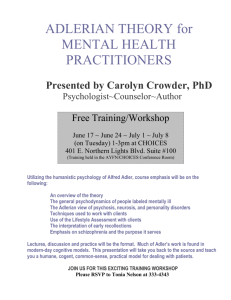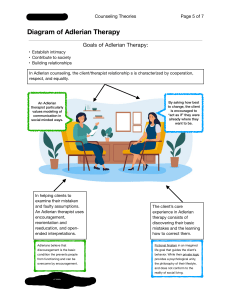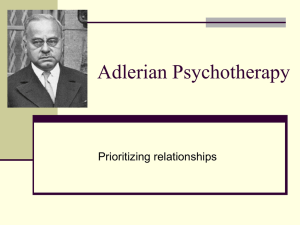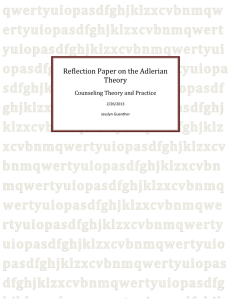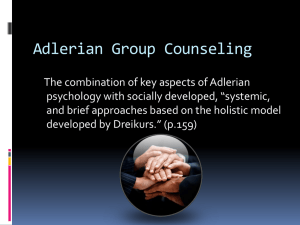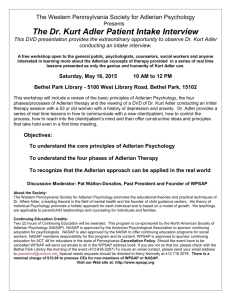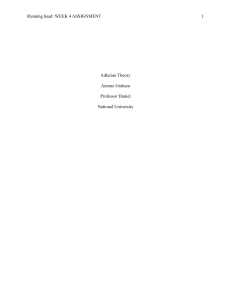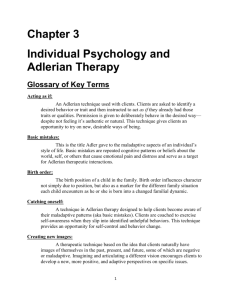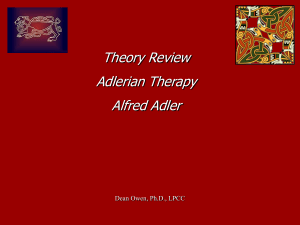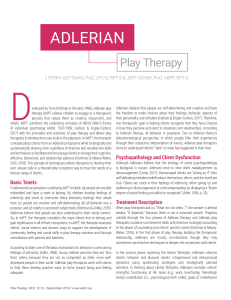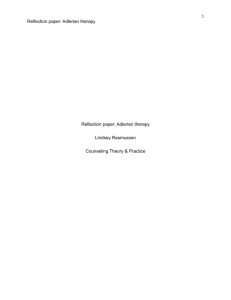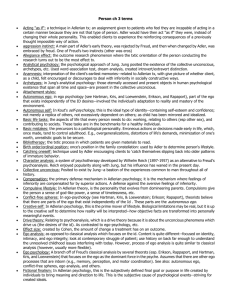Adler - Illinois
advertisement
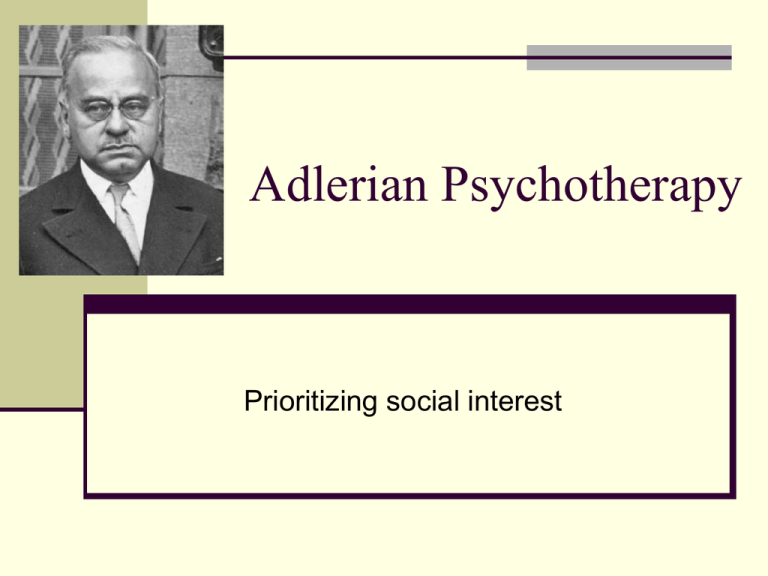
Adlerian Psychotherapy Prioritizing social interest History of Adlerian Theory Inspired by Freudian psychoanalysis, but did not buy into determinism or the primacy of sexual trauma Some overlap with other neo-Freudians (e.g., Horney) Anticipated elements of humanistic, cognitive, and systemic approaches Sought to overcome the superiority of the therapist Championed in U.S. by Rudolf Dreikurs Dissemination throughout U.S. elementary schools during the guidance movement by Don Dinkmeyer Alfred Adler 1870-1937 Born in Vienna Raised by middle class, Jewish family Very close to father (no Oedipal need) 2nd of six children Felt in shadow of his older brother Invalid as child (rickets, pneumonia) Freud’s professional associate and (initially) friend Converted and became a Christian After World War I 1921-1934: 30 mental health clinics in schools- closed by Nazis - drop in delinquency at time Came to USA in 1934 (lived in U.S. until his death) Adler’s Individual Psychology A phenomenological approach Social interest is stressed Birth order and sibling relationships are emphasized Therapy as teaching, informing and encouraging Basic mistakes in the client’s private logic The therapeutic relationship as a collaborative partnership The Phenomenological Approach Adlerians attempt to view the world from the client’s subjective frame of reference Reality is less important than how the individual perceives and believes life to be It is not the childhood experiences that are crucial ~ It is our present interpretation of these events Unconscious instincts and our past do not determine our behavior It is not genes It is not environment It is not genes and environment It is how we choose to respond to our genes and environment Social Interest Gemeinshaftsgefuhl – the state of social connectedness and interest in the well-being of others that characterizes psychological health. Adler’s most significant and distinctive concept Refers to an individual’s attitude toward and awareness of being a part of the human community Mental health is measured by the degree to which we successfully share with others and are concerned with their welfare Happiness and success are largely related to social connectedness Impact of Birth Order Adler’s five psychological positions: Oldest child favored, spoiled, center of attention, pseudo-parent, high achiever Second of two behaves as if in a race, often opposite to first child (rivalry) Middle often feels squeezed out Youngest the baby (more pampered), creative, rebellious, revolutionary, avant-garde Only may not learn to share or cooperate with other children, learns to deal with adults Encouragement Encouragement is the most powerful method available for changing a person’s beliefs Helps build self-confidence and stimulates courage Discouragement is the basic condition that prevents people from functioning Clients are encouraged to recognize that they have the power to choose and to act differently Note: Reassurance is not encouragement. Nature of maladjustment A person has a mistaken opinion of self and world Inferiority complex: Individual overwhelmed by inadequacy, hopelessness Superiority Complex: Individual’s very high opinion of self lead him/her to insist that personal solutions to problems are best A person engages in neurotic behavior to protect own opinion of self (e.g., when threatened with failure and insecurity) The person becomes self-centered rather than other-centered Conflict: “one step forward and one step backward movement” which has the net effect of maintaining an individual at a “dead center” point People experience themselves as “stuck” but actually create the antagonistic feelings, ideas, and values, because they are unwilling to change (if-only…) Safeguarding: Symptoms developed to safeguard the fictional goal (e.g., It’s my job to keep the peace in the family) Family constellation: birth order mediates genetic and constitutional factors The individual may be unconscious of these events Adlerian Therapy Focus Importance of the feelings of self (ego) that arise form interactions & conflicts Sense of self (ego) central core of personality Start from Psychoanalysis Emphasis on lifestyle (5 life tasks) Social interaction Work Sex Spirituality Coping with ourselves Courage Other Adlerian Concepts Organ Inferiority: everyone is born with some physical weakness, which motivates life choices Aggression Drive: reaction to perceived helplessness/inferiority lashing out against the inability to achieve or master More Adlerian Concepts Masculine protest: Men: Become a “real man”, surpass the father Women: Gain equal status to men Perfection striving: people who are not neurotically bound to an inferiority complex spend their lives trying to meet their fictional goals. “The life or a human soul is not a ‘being’ but a ‘becoming’” Elimination of their perceived flaws Gives motivation and focus Social Responsibility & Understanding Occupational task-career-self-worth Societal task-creating friendship-networks Love task-life partner Positive & Goal Oriented Humanity- people striving to overcome weaknesses to function productively-contributing to society Therapeutic Phases and Stages Phases Stage # Stage 1 Empathy & Relationship 2 Information 3 Clarification 4 Encouragement Support Encouragement 1. Establishing the relationship Therapist gets to know the client as a person Supportive, caring human connection Warmth, empathy, and acceptance Hope, reassurance, and encouragement Love Therapy is collaborative Goals established together prior to start Awareness of goal discrepancies during early phases Scripts (“Have you ever seen a patient like me before?”) Games (“My previous therapist said the opposite…”) Realignment of goals, when necessary 2. Gathering information Interview Client tells own story as expert on own life Presenting problem(s) Early recollections, influences (earliest memories, vivid memories from early adolescence) Life tasks Personality priorities Lifestyle Assessment -- therapist listens for clues to client’s coping and approach to life, develops therapy goals by identifying major successes and mistakes “The Question” -- If I had a magic wand that would eliminate your symptom immediately, what would be different in your life?” Family constellation, other paper-pencil tests Integration and summary 3. Facilitating Self-Understanding & Insight Insight = Understanding of motivations (the whys) that operate in client’s life Therapist clarifies vague thinking with Socratic questioning. Therapist invites evaluation of consequences of ideas and actions. Therapist gently challenges mistaken ideas about self and others. Therapist offers open-ended interpretations to: bring conscious awareness to unconscious processes identify and confront resistance explore purposes of symptoms, feelings, behaviors or blocks Types of interpretation Of nonverbal behavior: to bring the client’s nonverbal behavior to the attention of the client and interpret it. Of the therapeutic process: Dealing with what is in the here and now. Active wondering: Proposes an alternative to the presenting problem. 4. Encouraging and Reorienting Encouragement process – “to build courage” Personal change/growth is encouraged and reinforced Ongoing search for new possibilities Making a difference through change in behavior, attitude or perception Advantages of Adlerian Theory Applicable to diverse populations and presenting issues Does not consider people to be predisposed to anything Phenomenological Context-focused Empowering Disadvantages of Adlerian Theory Difficult to learn (e.g., making dream interpretations) Works best with highly verbal and intelligent clients. (potentially leaves out many people who do not fit this category) Might be too lengthy for managed care Adlerians do not like to make diagnoses Not compatible with managed care Difficult to systematically measure efficacy Challenging to develop problem-specific treatments Adlerian Approaches today Education Parent Education Marriage Counseling Family Counseling Group Work Adlerian Therapy Demonstration Session transcript Can you diagnose Gina using the DSM? What were her strengths? What did she need to work on? What did Carlson do to build the relationship? How was the intervention individualized? Was the therapy helpful to Gina? If not, why do you think it wasn’t? If it was helpful, what about it made it helpful? Would you want to work with an Adlerian if you were seeking therapy/counseling?
